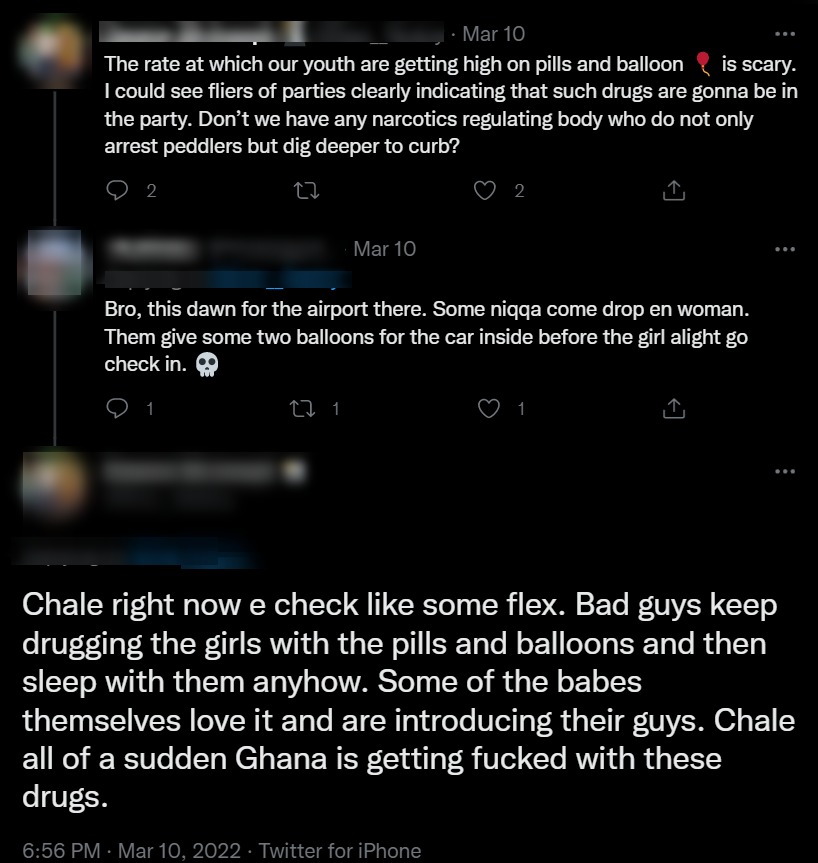Ghana has witnessed many forms of drug use or abuse among its youthful population in recent times with law enforcement authorities struggling to curb the practice.
But even as authorities struggle to deal with the existing cocktail of drugs among the user population, a new shade and form of drug use has pooped up.
While this new drug may differ in type, the disguised means by which it is used could make it even more difficult for narcotic control authorities to know about its existence let alone combat its use.
A global drug with multiple names
While the craze may be new in Ghana, in-depth searches online show that the abuse of the drug known as nitrous oxide is prevalent in many more countries.
Nitrous oxide is a colourless gas that is commonly used for sedation and pain relief.
In the drug world, however, it has many names, depending on local factors such as mode of use and after-use effects.
It has names such as laughing gas, nitro, N2O, NOS, nangs, whippet, hippy crack, buzz bomb, and balloons.
For instance, taking nitrous oxide can cause feelings of euphoria, relaxation, and calmness, fits of giggles and laughter, hence the nickname ‘laughing gas’.
The Ghana craze
In Ghana, nitrous oxide is commonly referred to as balloons and its use is a recent phenomenon. The name ‘balloon’ emanates from its mode of use.
Ballons are used at social events, especially parties and nightclubs, and those who use them, pipe the gaseous substances directly from inflated balloons, making it difficult for any ordinary onlooker to notice the act.
The gas is inhaled, by discharging its cartridges, also known as bulbs or whippets, into a balloon.
As is the case of all such mood-changing drugs, when nitrous oxide is inhaled, it produces a rapid rush of euphoria and a feeling of floating or excitement for a short period of time.
A Twitter user recently commented: Chale, right now e check like some flex. Bad guys keep drugging the girls with the pills and balloons and then sleep with them anyhow. Some of the babes themselves love it and are introducing their guys. Chale, all of a sudden, Ghana is getting f*******d with these drugs [sic].
The comment was in response to another Twitter user who expressed concern about the drug craze, saying the rate at which youth are getting high on pills and balloons is scary. I could see fliers of parties clearly indicating that such drugs are gonna be in the party. Don’t we have any narcotics regulating body who do not only arrest peddlers but dig deeper to curb [sic]?

Another evil extract from God’s blessings to man
Like tramadol, a pain killer that has been abused as an illicit drug, balloons were intended for man’s good until some members of society found the devil in it.
Nitrous oxide is commonly used by dentists and medical professionals to sedate patients undergoing minor medical procedures.
In some cases, they have served as food additives when used as a propellant for whipped cream.
Nitrous gas can also be used in the automotive industry to enhance engine performance. It is also increasingly being used to treat people withdrawing from alcohol dependence.
Nitrous oxide is classified as a ‘dissociative anesthetic’ and has been found to produce dissociation of the mind from the body (a sense of floating), distorted perceptions, and in rare cases, visual hallucinations.
Negative effects
While nitrous gas has the power to make one ‘high’, if an individual has too much of it, it deprives the brain of oxygen with a huge potential of causing brain damage.
Effects may include memory loss, nerve damage, ringing or buzzing in the ears, numbness in the hands or feet, and limb spasms.
Other effects may include potential birth defects (if consumed during pregnancy), weakened immune system, disruptions to reproductive systems, depression, psychological dependence, or psychosis.
Distribution and regulation of balloons
Considering that balloons have never been considered hard drugs, their distribution has been fairly easy across the globe.
Until recently, countries like the UK were loose in regulating the product, making it possible to buy same over the counter.
In Ghana, the situation hasn’t been different as there is little or no regulation regarding its distribution and use.
Perhaps, the time has come for some legislation and control of the product’s distribution because of the social effects of its abuse among the population.


